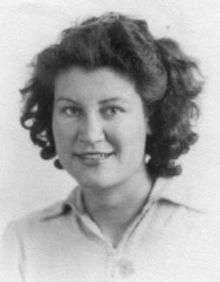Phyllis Nicolson
| Phyllis Nicolson | |
|---|---|
 | |
| Born |
Phyllis Lockett 21 September 1917 Macclesfield |
| Died |
6 October 1968 Sheffield |
| Nationality | United Kingdom |
| Fields | Mathematics, Physics |
| Alma mater | Manchester University |
| Thesis | Three Problems in Theoretical Physics[1] |
| Known for | Crank-Nicolson method |
Phyllis Nicolson (21 September 1917 – 6 October 1968) was a British mathematician most known for her work on the Crank–Nicolson scheme together with John Crank.
She was born Phyllis Lockett in Macclesfield and went to Stockport High School for Girls. She graduated from Manchester University with a B.Sc. in 1938, M.Sc. in 1939 and a Ph.D. in Physics in 1946. She was a research student from 1945-46 and research fellow from 1946-49 at Girton College, Cambridge. She married Malcolm Nicolson, also a physicist, in 1942; after his accidental death in 1951[2] she was appointed to take over his lectureship in Physics at Leeds University. In 1955, she married physicist Malcolm McCaig.[3] She died from cancer in 1968 in Sheffield.
References
- ↑ "The Mathematics Genealogy Project - Phyllis Nicolson".
- ↑ "https://www.thegazette.co.uk/London/issue/39486/page/1373/data.pdf" (PDF). External link in
|title=(help) - ↑ "Nicolson biography".
This article is issued from Wikipedia - version of the 6/3/2016. The text is available under the Creative Commons Attribution/Share Alike but additional terms may apply for the media files.